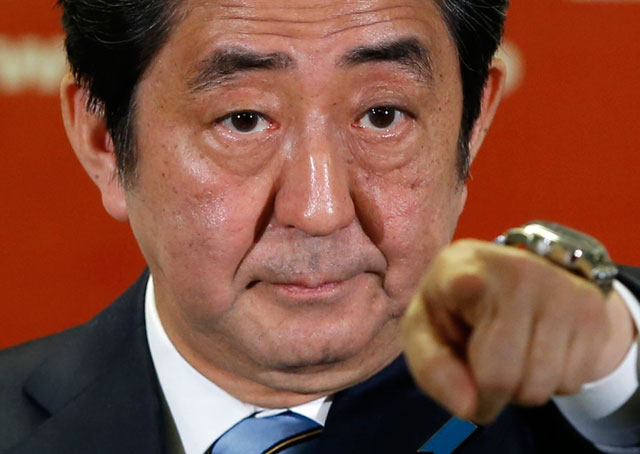TOKYO — Prime Minister Shinzo Abe on Monday vowed he would try to persuade a sceptical public of the need to revise Japan's pacifist constitution, the day after scoring a thumping election victory.
The premier, who was re-elected by a landslide in Sunday's polls, pledged to pursue his nationalist agenda while promising to follow through on much-needed economic reforms.
"Revising the constitution... has always been an objective since the Liberal Democratic Party was launched," Abe told reporters.
"I will work hard to deepen people's understanding and receive wider support from the public."
Abe's desire to water down Japan's constitution, imposed by the US after the end of World War II, has proved divisive at home and strained already tense relations with China.
His attempt earlier this year was abandoned, with the bar of a two-thirds parliamentary majority and victory in a referendum thought too high.
The conservative leader has also said he wants reforms to education that would instill patriotism in schoolchildren and urges a more sympathetic retelling of Japan's wartime misdeeds.
His ruling LDP and its junior partner Komeito swept the ballot on Sunday with a two-thirds majority in the lower house of parliament.
The coalition won a combined 326 of the 475 seats, crushing the main opposition Democratic Party of Japan. Their slightly improved tally of 73 did not include leader Banri Kaieda, who fell on his sword on Monday.
Abe is expected to reappoint a broadly similar Cabinet after he is formally named prime minister again by the lower house on December 24.
Abenomics go-ahead
He insisted the election had been a necessary plebiscite on his big-spending, easy-money policies, known as Abenonmics, although critics said the record low turnout of around 52 per cent tarnished his mandate.
"We must go ahead with Abenomics swiftly, this is exactly what has been shown in the vote. We have to respond to that," Abe said, pledging to "compile an economic stimulus package immediately, within this year".
The 60-year-old stormed to power in 2012, pledging to revive the animal spirits of Japan's flagging economy with a blend of monetary easing, government spending and structural reforms to cut red tape.
The printing presses at the Bank of Japan have run hot ever since, pushing down the value of the yen — to the delight of exporters — and giving the stock market a huge boost, as stimulus programmes have provided an economic shot in the arm.
But the premier has shied away from tough reforms that economists say are vital if Japan is to get back on a firm footing, including employment deregulation and tackling the entrenched interests of the agriculture lobby.
A sales tax rise in April snuffed out consumer spending, sending Japan into the two negative quarters of growth that make a recession.
"From now on, he has to show results in line with his promises," said Hideo Kumano, chief economist at Dai-ichi Life Research Institute.
"If he fails to improve the economy, his political capital will be reduced easily. A crucial phase is still ahead."
On the diplomatic front, his election victory may temper frayed relations with China, which has painted him as a dangerous revisionist, said Gerald Curtis, a veteran Japan watcher and professor at Columbia University
Relations began to thaw last month after more than two years of chill, which Beijing blamed on Abe's provocative nationalism, including a visit to a war shrine and equivocations on Japan's wartime record of enslaving women for sex.
Beijing said it had "noted" the outcome of the election, and offered a familiar call for Japan to "learn its lessons from history [and] play a constructive role in regional peace and stability".
"In the short term, at least, Sino-Japanese relations are on a better track... signals coming from Beijing and from Abe [are aimed at trying] to improve the relationship," Curtis said.
Masaru Kohno, a politics professor at Waseda University in Tokyo, said despite his professed desire to retell the history of Japan's aggressive warring — an instinct largely unshared by the Japanese public — Abe will be pragmatic.
"Many of the issues Japan is facing such as depopulation and women's advancement should be resolved with liberal policies," he said.
